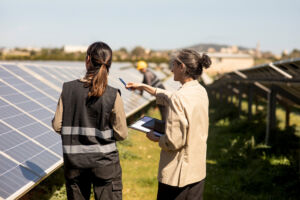How to make Germany's climate policy gender-responsive: Experiences from research and advocacy
Gotelind Alber et al.
The aim of the project is to better anchor gender perspectives in climate policy. To this end, it is investigating the mechanisms of action between gender and climate policy.
For a long time, the international and national climate policy was regarded to be gender neutral. It has only been a few years that the gender perspective has gained more attention but mainly on the level of international climate policy. In industrial countries like Germany on the other hand, the importance of gender relations for effective measures of climate policy is still hardly considered. The project is aiming to more firmly anchoring the gender perspective into climate policy. To this end, mechanisms of action between gender and climate policies will be analyzed as well their interactions with other social categories like for instance age, income, and cultural background, as well as options for action.
Besides a systematic literature review on gender and climate policy, the instrument of Gender Impact Assessment (GIA) will exemplarily be tried out and developed for the areas of climate adaption and climate protection. The application of GIA enables political decision-makers to assess gender specific effects of climate protection and adaption measures thus facilitating a reinforcement of intended effects and the avoidance of unintended ones. With the help of secondary analyses the team from ISOE will investigate existing GIA in the areas of environment and climate and will also look at other impact and effect assessments that include a pronounced gender dimension as for example technology assessment, legal impact assessment and vulnerability analyses. These analyses will be the basis for further developing the instrument of GIA and for testing and evaluating it in selected fields of action which for instance include the areas of traffic and energy supply in private households. Here, the general question is in how far the measures taken contribute to reduce or possibly increase gender hierarchies.
So far, in science there is only few evidence that indicates in how far the consideration of the gender perspective entails a qualitative change of climate policies and what influence on the other hand climate policy has on gender relations. That is why the project investigates which benefits the gender perspective has for climate protection and climate adaption. For this purpose, GIA instruments will be further developed and tried out in the area of climate policy. Furthermore, data requirements with according survey methods will be determined. Finally, the researchers will develop specific action and policy recommendations for the area of climate policy.
The project „Gender equality as a contribution to successful climate policy: impact assessment, interdependencies with other social categories, methodological aspects and development options” is carried out on behalf of the Federal Environment Agency (FKZ 3716411190).
Gotelind Alber et al.
Arn Sauer, Immanuel Stieß
Meike Spitzner et al.
Can sustainability be achieved through technological developments alone? How can transformations towards sustainability be shaped in the face of escalating crises and conflicts?
Go to Topic Page
